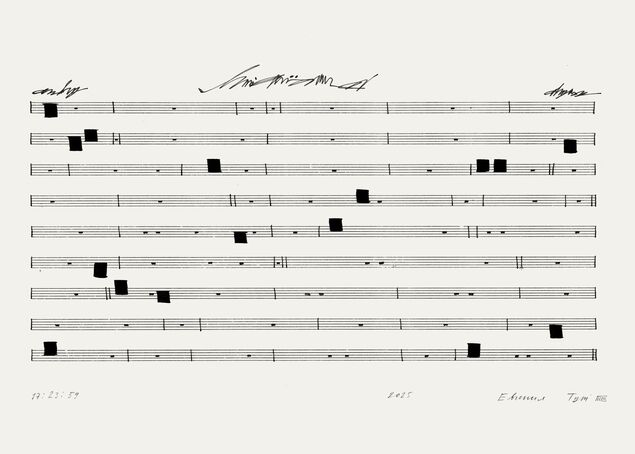Pain and hope, memory and grief, voices of the present, and the living echo of history in a concert by the Intrada vocal ensemble.
Voices of Remembrance
- Date:
- 27 Apr 2025,
20:00–21:30
- Age restrictions
- 12+
Programme
Pavel Chesnokov (1877–1944)
Spaseniye sodelal yesi (“Thou Hast Made Salvation”), 1913
Arnold Schoenberg (1874–1951)
Friede auf Erden (“Peace on Earth”), 1907
Rudolf Mauersberger (1874–1951)
Wie liegt die Stadt so wüst (“How Desolate Lies the City”), 1945
Josquin des Prez (1450–1521)
Missa “L’homme armé,” (“The Armed Man”), c. 1490
Igor Stravinsky (1882–1971)
Symphony of Psalms, 1930
The programme of this concert, commemorating the 80th anniversary of victory in the Second World War, intertwines choral works spanning 600 years of the musical art, from the fifteenth to the twenty-first centuries. Each of the works portrays in its own way the tragedy of war and the search for harmony, reminding us of the price that mankind pays, century after century, for peace. One of the principal musical symbols of the Renaissance, the song L’Homme armé (“The Armed Man,” c. 1490), enters into dialogue with the liturgical hymn Thou Hast Made Salvation (1913) by Pavel Chesnokov. The fragile late-Romantic utopia of Arnold Schoenberg’s Friede auf Erden (“Peace on Earth,” 1907) is shattered by deafening silence, which sounds louder than a cannonade, in Rudolf Mauersberger’s motet Wie liegt die Stadt so wüst (“How Desolate Lies the City”), which was written shortly after the bombing of Dresden and first performed on 4 August 1945 in the ruins of the burnt-out Kreuzkirche, the city’s main church. Arvo Pärt’s choral meditation Da pacem domine (“Give Peace, Lord,” 2004) is echoed in Igor Stravinsky’s Symphony of Psalms (1930). Stravinsky’s score, composed between the two world wars in an attempt to find meaning, light, and faith, reminds us that choral music is a music of togetherness.
Performed by
Intrada Vocal Ensemble
Ekaterina Antonenko conductor
Fyodor Lednev conductor
Sergei Kasprov piano
Yury Polubelov piano
Alexander Suvorov drums
Yaroslav Timofeev concert host

Illustration: Evgenia Tut
The Intrada vocal ensemble was founded in 2006 by Ekaterina Antonenko, a graduate of the Moscow Conservatory. It has taken part in many high-profile projects in Russia and abroad, and has proved its merit as one of the most versatile and professional vocal ensembles of our days. In 2019 and 2021, it was voted Ensemble of the Year by the newspaper Muzikalnoe Obozrenie. Intrada regularly collaborates with leading ensembles and musicians in Russia and abroad, notably the Moscow Soloists chamber orchestra and Yuri Bashmet, the Svetlanov Symphony Orchestra and Vladimir Jurowski, the Russian National Orchestra and Mikhail Pletnev, Le Poème Harmonique and Vincent Dumestre, Il Giardino Armonico and Giovanni Antonini, The Tallis Scholars and Peter Phillips, VOCES8, I Fagiolini and Robert Hollingworth, the Orchestra of the Age of Enlightenment, Frieder Bernius, Stephen Layton, Hans-Christoph Rademann, Peter Neumann, Jean-Christophe Spinosi, and many others. The ensemble has also performed at the “December Nights of Sviatoslav Richter” at the Pushkin Museum.
Fyodor Lednev (b. 1971, Minsk) is a conductor. He graduated from the Saint Petersburg Conservatory specialising in choral conducting (1995) and operatic and symphonic conducting (1998). Since 1995, he has taught at the Saint Petersburg Rimsky-Korsakov Music College. He has appeared as guest conductor with leading Russian orchestras, including the Svetlanov State Orchestra, the Russian National Orchestra, the Russian National Youth Symphony Orchestra, the musicAeterna Choir and Orchestra, and others. In 2024 he won the prize for Best Conducting Work at the Golden Mask theatre awards in Moscow.
Sergei Kasprov (b. 1979, Moscow) is a pianist, harpsichordist, and organist. He studied historical performance on keyboard instruments at the Moscow Conservatory under Alexei Lyubimov and organ under Alexei Parshin. Kasprov completed postgraduate studies as a pianist, also at the Moscow Conservatory, and trained at Schola Cantorum in Paris under Igor Lazko. In 2005–2007, he was awarded a special prize at the International Competition for Young Pianists in Memory of Vladimir Horowitz in Geneva, the Grand Prix at the Maria Yudina International Competition for Young Pianists in Moscow, and the first prize at the Rubinstein and Scriabin competitions in Paris. He is a regular participant of piano festivals in Europe and Russia, including La Roque-d’Anthéron (France), Klarafestival (Belgium), Chopin and His Europe (Poland), Arts Square (Saint Petersburg), December Evenings, and Antiquarium (Moscow).
Yuri Polubelov (b. 1960, Vitebsk) is a pianist. He graduated from the Moscow Conservatory, where he studied with Vera Gornostaeva, remaining there for postgraduate studies under Valery Kastelsky and Mikhail Ovchinnikov. He now teaches piano, as well as vocal and instrumental chamber music at the Conservatory. He has made recordings for Melodiya, Naxos, TNC Records, and FANCYMUSIC, and has organised a number of music festivals: Musical Portrait of the Great French Revolution (Moscow, 1989), Days of Alexander Zemlinsky in Moscow (Moscow, 1998), and Ernst Krenek at the Helikon Opera (Moscow, 2000). A number of composers (Alexander Vustin, Valentin Silvestrov, and Alexander Shchetynsky) have dedicated works to Polubelov.
Yaroslav Timofeev (b. 1988, Novgorod) is a musicologist, concert presenter, and lecturer. He is a graduate of the Moscow Conservatory, chief editor of Musical Academy magazine, and has worked since 2010 at the Moscow Philharmonic Society (Russia’s largest concert organisation) where he leads a number of projects: Mum, I’m Crazy about Music (since the 2017/2018 season), The Language of Music (co‑author and presenter since 2018/2019), Thing-in-Itself (author and presenter since 2021/2022), and All Stravinsky (author and presenter since 2022/2023). He has performed since 2017 as pianist with the Russian indie group, OQJAV.